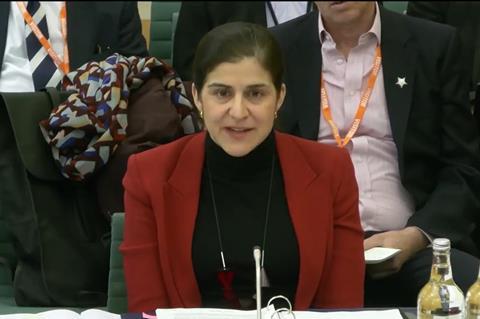The minister in charge of civil justice has admitted some litigants and judges may be driven away by the state of the county court system.
Appearing before the justice committee yesterday, Sarah Sackman KC said the system had not recovered from the Covid pandemic and that ‘we are not where we want to be’ in terms of timeliness and the digitisation of the court process.
Sackman said her ambition was for the service to work as efficiently as passport renewals and for an average 30-week turnaround for small claims. The average waiting time for small claims to come to trial in 2024 rose to more than 50 weeks – some 14 weeks longer than in 2019.
‘If I were handing out a report, I would say there is room for improvement,’ said Sackman. ‘I can’t be satisfied when it is taking on average over 125 weeks in London and the south-east to dispose of multi-track cases. I cannot be satisfied and say that there isn’t room for improvement in circumstances where the average time for dealing with a small claim again in London the south-east – which is the region with the greatest challenges – is 67 weeks.’
She conceded there may be cases that are not brought because people with a legitimate claim think ‘I just cannot be bothered’ with a paper-based system that is going to take the best part of a year.
On judicial recruitment and retention, she said there was no lack of passion from the bench about the job but the conditions may be driving some away.
‘It’s not so much a question of pay but they too feel that the conditions they are working in, buildings which are often in poor condition and [they are] also dealing with the challenges of a largely paper-based system which has inefficiencies in it. All of that can be demoralising.’

Read more
The committee MPs said they had serious concerns about the efficiency of the centralised claim centre based in Northampton and the number of staff carrying out menial tasks such as scanning documents. They also reported feedback from stakeholders who said they found it impossible to contact individual county courts and believed that engagement levels had got worse in the last 20 years.
Sackman said the court service had managed to get waiting times for answering phones down from as much as 40 minutes to just three. The Northampton centre receives 150,000 calls a month and the phone service has been fully centralised since February.
Appearing alongside the minister, Daniel Flury, operations director for HM Courts & Tribunals Service, rejected the idea that it was better when court users could phone somebody based in each county court.
He added: ‘They were very unsophisticated telephone systems, there was very little management information, there was very little advanced telephony that told us how many people were waiting and how long they had been waiting for.
‘I am hoping the court users will recognise this one day: we are seeing post-centralisation a vast improvement in our telephones, from call waiting times to abandonment rates.’
The committee heard that the Ministry of Justice is awaiting a decision on further funding to extend the digitisation of the court service. Civil servants estimate that defences can be filed electronically with an extra £6-8m of investment. This will be decided by the spending review carried out later this year.
This article is now closed for comment.





























18 Readers' comments